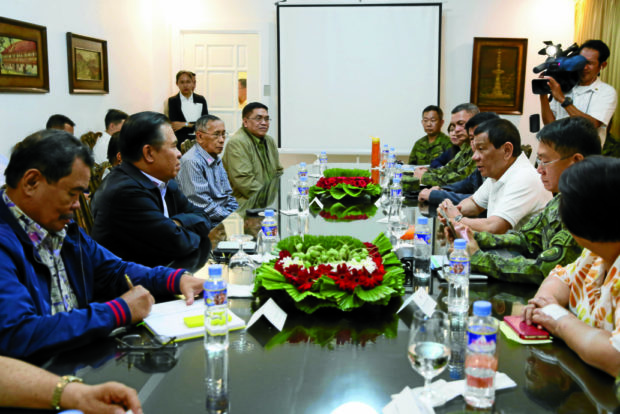Gov’t, MILF to set up peace corridor for Marawi folk

President Rodrigo Roa Duterte engages in a discussion with Moro Islamic Liberation Front (MILF) Chairman Al Haj Murad Ebrahim and other MILF officials including Implementing Panel Chairman Mohair Iqbal, Bangsamoro Transition Commission Chairman Ghazali Jaafar, Bangsamoro Islamic Armed Forces Chief of Staff Sammy Al-Mansoor, and Bangsamoro Supreme Court Chief Khalifa Nando during a meeting in Davao City on May 29, 2017. Joining the President, meanwhile, are Presidential Adviser on Peace Process USec. Nabil Tan, Armed Forces of the Philippines (AFP) chief of staff Gen. Eduardo Año, BGen. Earl Baliao of the AFP, Capt. Nichols Driz of the Philippine Navy, GPH Implementing Panel Chairperson Irene Santiago, and OPAPP ASec. Ma. Cecilia Papa. PRESIDENTIAL PHOTO
The Moro Islamic Liberation Front (MILF) will work with the government in establishing safe zones for residents fleeing fighting in Marawi City.
The Department of Social Welfare and Development (DSWD) said on Wednesday about 92,000 residents had been affected by the conflict—more than half of them still trapped in the city.
The “peace corridor” would be handled by the implementing panels of the government and the MILF and would be used to facilitate humanitarian operations for civilians trapped in the conflict zone in Marawi, presidential spokesperson Ernesto Abella told reporters on Wednesday.
The agreement to put up the peace corridor was made during a meeting between President Duterte and the MILF on Monday.
Irene Santiago, chair of the government’s implementing panel, would lead the humanitarian missions.
Article continues after this advertisementThe MILF agreed to help secure the areas that the corridor would traverse.
Article continues after this advertisementSafe space
Santiago said the members of the implementing panels would meet this week to discuss the setting up of the corridor.
“The peace corridor is a secure space where humanitarian groups may evacuate wounded and trapped civilians, and retrieve dead bodies for burial,” she said in a statement.
“The corridor is also a safe space for goods to reach hungry people in the rural areas whose access to Marawi’s markets have been cut off,” she added.
The 1997 peace agreement between the government and the MILF provides for the observance of international humanitarian laws and respect for internationally recognized human rights instruments. The two parties have been engaged in the relief and rehabilitation of conflict zones in Mindanao.
The military on Wednesday outlined procedures for civilians caught in conflict areas in Marawi.
Brig. Gen. Restituto Padilla, Armed Forces spokesperson, noted that some of the residents trapped in the area had been afraid to come out for fear of being caught in the crossfire.
To ensure their safety, when they sense the presence of military forces, they should prepare a white cloth that they should raise in the area where they are located, Padilla said.
When they see the soldiers approaching, they should come out—women and children first—with their hands up. They should stay in the area where they are and only move if asked to do so by the soldiers, he said.
They must follow the soldiers’ instructions once they have been told to move forward, he said.
“These procedures are intended to assuage the concerns of civilians in the province, and of our forces who are carefully entering the areas where the enemy forces are located,” he said.
Displaced families
As of Wednesday, the DSWD had documented 92,628 residents from 18,609 families affected by the conflict.
Only a little over a tenth of affected residents, or 13,194 individuals from 2,722 families, are staying in 22 makeshift evacuation sites in Lanao del Norte and Lanao del Sur provinces.
The majority, or 79,434 persons from 15,887 families, have sought shelter in the homes of relatives and friends.
These include 56,555 individuals or 11,311 families still inside Marawi, according to the DSWD.
Ghadzali Jaafar, MILF political affairs chief, said the group started to help evacuate civilians after MILF chief Murad Ebrahim met with the President in Davao City on Monday night.
“We escorted them out of their homes to nearby towns outside the city,” Jaafar said. —WITH REPORTS FROM EDWIN O. FERNANDEZ AND RYAN D. ROSAURO